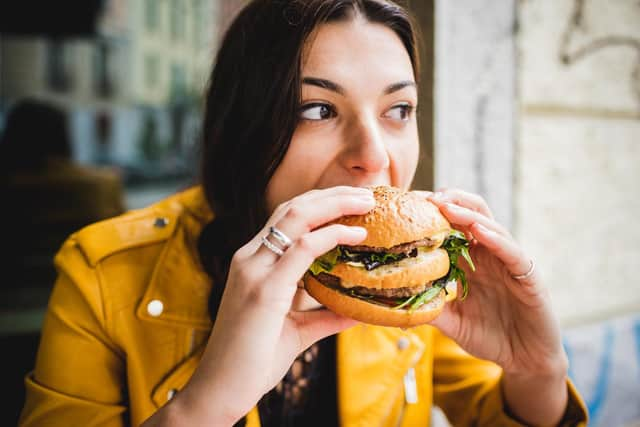Deliveroo and Just Eat may be driving obesity but we should stop taking sides - Jayne Dowle
I’ll never be a size 12 again – and even in my skinniest twenties that was a fleeting thing – but I try to eat and cook healthily for my family of husband (who has a calorie-demanding job as a builder) and two teenagers.
Everyone in our house knows that takeaways are for a treat, not a daily staple, although the teenagers always try to push it, especially on those long afternoons when my daughter is home on school holidays.
Advertisement
Hide AdAdvertisement
Hide AdSo I was very interested to hear about the new WHO (World Health Organisation) report citing takeaways as the biggest – literally – factor in British obesity rates. It’s quite the thing, these days, to order something like burger and chips and/or cheesecake from the comfort of your bed, then lounge about in your pyjamas consuming the order that’s been delivered to the door.


Not in our house, I say and the kids groan. I tell them they’ll thank me for it later when their waistlines stay as trim as they are now.
I’m not perfect, by any means, and in no position to judge, except for the shaky grasp on my own offspring’s behaviour. And I don’t wish to add further polarisation to the debate raised by the report, which warns that within a decade, Britain is on track to be the fattest nation in Europe. But it does need talking about.
By the early 2030s, more than a third – 37 per cent – of British men and women are expected to be obese, it says, up from the present figure of 28 per cent.
Advertisement
Hide AdAdvertisement
Hide AdThe WHO is keen to point out that the UK’s obesity rise is being particularly driven by takeaway services such as Deliveroo and Just Eat and sedentary lifestyles – all that WFM has much to answer for. I’m wondering, as I consider this, what happened to all those smug lockdown social media posts with people bragging about how many “steps” they had achieved in a day?
And all those people (often one and the same) who couldn’t go for a nice stroll in the countryside without it turning into a “5K’”mini-marathon?
See what I mean about polarisation? Taking a stance on healthy eating can be so divisive. You’re either fit, or you’re fat. And there, I’ve said it. The F-word.
There is an interesting counter-argument that people should be allowed to be the shape and size they want. To argue otherwise is considered dangerous “body-shaming”, which amounts to emotional abuse and can cause detrimental effects on mental health. If I was to come down on one side, I’d be on this one actually; I’ve known too many people (male and female) become so obsessed with staying thin they have ended up seriously ill.
Advertisement
Hide AdAdvertisement
Hide AdSadly, this determination to name, blame and shame does nothing to create healthy debate. It’s so judgemental. How do you know, for example, from your lofty heights eating a chickpea salad, that your colleague who goes home to the Just Eat app every night isn’t lonely, depressed and completely lacking the motivation to cook? Or was never taught as a child? Or even saw their parents open the oven door, except to shove in a frozen pizza and chips?
Take some heart. We’re not alone. The report also says that across the continent people are beginning to consume more food prepared outside the home. Yes, even in France, where gastronomy is prized.
While there are few studies specifically on the links between meal delivery apps and obesity, it cites UK research which shows that an individual eating a takeaway meal consumes on average 200 more calories per day than when eating homemade food.
Such meals are typically higher in calories, fat, sugar and salt, while portion sizes are often larger. This “encourages overeating, particularly if there is little price differential between portion sizes”, the report adds.
Advertisement
Hide AdAdvertisement
Hide AdExcess weight is directly cited in up to 200,000 new cancer cases annually, and has been linked to health problems such as heart disease, type 2 diabetes and musculoskeletal conditions.
Obviously, this has serious implications. Not just for individual health, but for government spending on the NHS and the benefits system.
It really is time for a serious reassessment of how we all consider what we eat and how we eat it. There is no point leaving this to the politicians, who at the moment have, er, bigger fish to fry. We all, regardless of upbringing, social background and household budget, have a choice.
Making positive decisions comes down to personal responsibility, just like smoking, drinking alcohol to detrimental excess and using illegal drugs.
It’s time to stop blaming other people and other things for unhealthy eating habits. And time, above all, to stop taking sides.